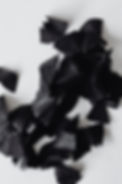
Activated carbon is a highly porous material known for its exceptional adsorption capacity, making it ideal for effectively removing impurities, toxins, and contaminants.
Our commitment to sustainability is a key differentiator, setting Bygen apart from our competitors in the global activated carbon market. We produce activated carbon using renewable nut shells and sustainable forestry raw material inputs. We have pioneered a minimal CO₂ footprint production process that significantly reduces the need for fossil fuel heating during activation.
Sustainable and
Eco-friendly Activated Carbon in Australia
At Bygen, we supply activated carbon to customers in industries like water filtration, air purification, pharmaceuticals, cosmetics, and manufacturing. Activated carbon's unique properties make it essential for improving environmental outcomes from industrial/residential activities, reducing product contamination and improving human health.
Activated Carbon
A Critical Organic Adsorbing Agent
Activated carbon is one of the most efficient and cost-effective adsorbers of organic contaminants making it a desirable additive in many different industries. Known for its versatility, activated carbon is used to treat liquids and gases as well as in soil remediation applications. From eliminating organic contaminants contained in water to removing natural colours from fruit juices and sugar, activated carbon is a crucial process additive.
Activated carbon is generally made from materials with high carbon content, like wood, coal, or coconut shells. These are effective raw materials to produce activated carbon, but they present challenges when viewed with an ESG and sustainability lens. Substrates like coal are innately unsustainable, and coconut shells often have significant issues attached to their supply chain sustainability and ethics.
Our activated carbons are produced using sustainable biomasses like nut shells (including almonds, walnuts and hazelnuts) and sustainable forestry wood sources. We process these organic materials under high temperatures in a controlled environment which uses less energy and has a lower carbon footprint than traditional activated carbon production.
Bygen's sustainable activated carbon also meets rigorous quality standards. We conduct both in-house and third-party tests for ash content, surface area (BET/iodine numbers), pore size distribution, and ash speciation to ensure our clients receive top-quality activated carbon.
Types of Activated Carbon

Granular Activated Carbon (GAC)
Made from sustainable biomass, our granular products are suitable for applications where pressure drop is a major consideration. With a combination of high surface area and flexible particle sizes, our GAC is suitable for any traditional application where activated carbon is the go to filtration solution.

Powdered Activated Carbon (PAC)
Sourced from natural raw materials such as wood and nut shells, PAC is easy to apply and cost-effective, making it ideal for liquid phase applications due to its rapid kinetics, including water purification and industrial treatments.

Key Applications
Activated carbons, in all forms, have a broad range of applications. At Bygen, we take pride in our experience and expertise in assisting our clients with the following uses:

Why Choose Bygen’s Activated Carbon?
High-Quality Activated Carbon
High Adsorption Capacity
Local, Sustainable Raw Materials
Cost-Effective
Highly Versatile
Supports Corporate ESG Goals & Other Sustainability KPIs
Low Carbon Footprint

CONTACT US
38 Mercedes Drive
Thomastown, VIC 3074
Phone: +61 3 9465 2140
General Enquiries: info@bygen.com.au
Sales Enquiries: sales@bygen.com.au

